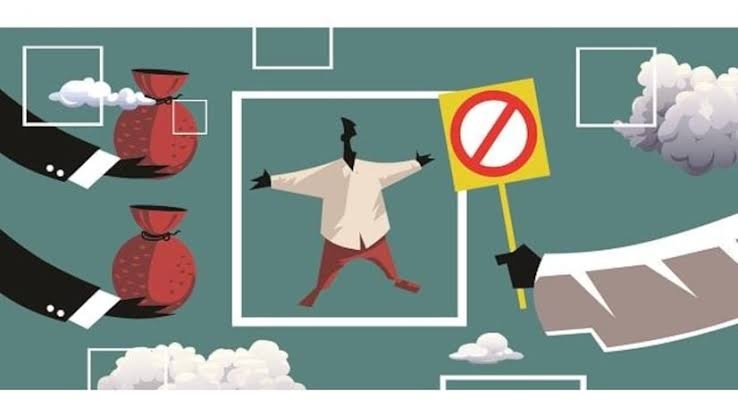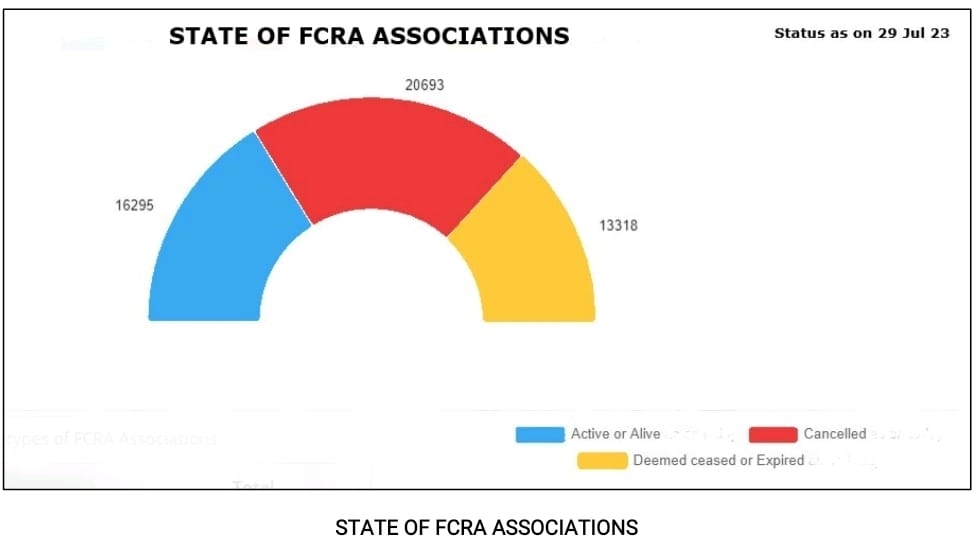NGOs and Foreign Donations

Foreign-funded Non-Governmental Organisations (NGOs) have always been in the news, albeit for wrong reasons. Most of them are accused of corruption, mismanagement of funds, absence of a well-defined mission, lack of a consistent plan, opacity in functioning and political agenda. Some NGOs have been known to have indulged in anti-national activities and misused funds to stall the country's economic progress.
Under the Foreign Contribution (Regulation) Act (FCRA), NGOs can receive foreign donations only after obtaining necessary licence. Section 11 of FCRA 2010 prescribes that no person, save as otherwise provided in the Act, shall accept foreign contribution unless such person obtains a certificate of registration or prior permission of the Central Government.

As on 29 July 2023, India had a total of 16,295 active NGOs. FCRA licence of 20,693 NGOs had been cancelled while the licence of 13,318 was considered ‘deemed ceased or expired’. Top five states with all types of FCRA Associations were –
• Tamil Nadu – 6527
• Maharashtra – 5210
• Andhra Pradesh – 4169
• West Bengal – 4127
• Karnataka – 3688
In 2017-18, foreign receipts amounted to Rs 16,941crores. They stood at Rs 16,491 crores in 2018-19, Rs 16,306 crore in 2019-20, Rs 17,059 crore in 2020-21 and Rs 22,085 crore in 2021-22. Thus, Indian NGOs received foreign contributions worth Rs 88,882 crores between 2017-18 and 2021-22.
NGOs based in Delhi received max funds during 2019-20, 2020-21 and 2021-22. Karnataka was second in 2020-21. Tamil Nadu occupied second position in 2019-20 and 2020-21. Maharashtra consistently occupied the fourth spot.
The Act
In order to regulate acceptance and usage of foreign funds by individuals and associations, the Act was first enacted in 1976. The primary aim was to prevent foreign entities from having undue influence on the working of governmental or non-governmental organisations in the country through contributions.
The 1976 Act was repealed in 2010 and a new FCRA enacted. Its objective was to consolidate the law on foreign funds and ‘prohibit acceptance and utilisation of foreign contribution or foreign hospitality for any activities detrimental to national interest’.
The Act defines foreign contribution as ‘donation, delivery or transfer made by any foreign source’, be it Indian or foreign, or any article valuing more than the stipulated value. Permission to accept a foreign contribution is granted for a specific purpose, i.e., cultural, economic, educational, religious or social programmes.
The registration is valid for five years, after which the NGO has to renew it. Without timely renewal, the registration is deemed to have expired. Funds must not harm the sovereignty of the country or impact the functioning of any legislature adversely or cause inter-group disharmony. Funds must not be misused for personal gains and only 20 percent of foreign funds can be used for administrative purposes.
Most interestingly, electoral candidates, members of any state or central legislature, political parties, public servants, judges, newspaper or media broadcast agency owners, editors or correspondents, are prohibited from receiving any foreign contribution under the Act.
Misuse of Foreign Donations for Anti-national Activities
Under the new rules notified by MHA in 2015, NGOs are required to give an undertaking that the acceptance of foreign funds is not likely to prejudicially affect the sovereignty and integrity of India or impact friendly relations with any foreign state and does not disrupt communal harmony.
However, it is extremely difficult to monitor the funds that NGOs receive and ensure their purposeful expenditure. Several transnational NGOs have been found guilty of violating provisions of FCRA. Many of them have been indulging in political activities by deviously funding electoral candidates, political parties, public servants, judges and even media personnel (owners, editors and correspondents).
They cultivate influential intellectuals and government functionaries to create subjective lobbies to influence government policies. For that, seminars and study tours to foreign countries are organised with lavish hospitality in five-star hotels.
These lobbies generally further the nefarious agenda of the donor entities, either by stopping developmental projects or creating dissentions in the society or inciting people against the duly elected government. They defame the country through subjective articles written by the paid media. Some resort to anti-national activities blatantly by promoting sedition. In short, such NGOs act as agents of the foreign countries and manipulate public opinion with their subjective agenda.
Many NGOs misuse funds to create social disharmony by sponsoring religious conversions through enticements and creating dissentions between the communities, as was witnessed in the North East tribal societies. It is a well-known fact that most US and Western NGOs are working in tandom with the Church to evangelise the vulnerable segments. Similarly, massive funds are received from the gulf countries to contruct mosques and radicalise the youth.
Several international and prominent NGOs such as Greenpeace India, Sabrang Trust, Amnesty International and Compassion International have come under the government's scanner for alleged violations of the FCRA. Most of them have been accused of financial irregularities or political activity.
Many NGOs receive funds from anti-India foreign donors to stop developmental projects. Allegedly, NGO ‘The Other Media’ misused foreign funds to organise protests and demonstrations around Vedanta’s Sterlite copper plant in Thoothukudi (Tamil Nadu). The protests turned violent and 13 people died in police firing. The plant which was producing 40 percent of India’s copper requirement had to be shut down. The closure has affected around 400 downstream businesses, employing approximately 100,000 people. National loss is estimated at Rs 14,000 crore. From being a major exporter of copper, India has become a net importer.
Kerala government’s ambitious Vizhinjam Port Project is being developed by the Adani group since 2015. Once completed, it will be India’s first Mega Trans-shipment Container Terminal with 30 berths and the capacity to handle massive “megamax” container ships. The port is expected to compete for trans-shipment traffic with Colombo, Singapore, and Dubai. As if on a cue from some foreign entities, an agitation was started by the local fishermen in August 2022, alleging sea erosion. The clergy-led agitation succeeded in stalling the port construction work for over four months.
Numerous infra-structure projects are stalled by such NGOs through repeated appeals to the courts by citing imaginary environmental risks. The prolonged agitation against the Narmada dam is still fresh in public memory. There are innumerable such examples.
In addition, funds are often diverted to the personal accounts of the office bearers who acquire personal wealth while pretending to be working for the under-privileged people. Under the garb of administrative expenses, funds are used to acquire huge bungalows with all attendant luxuries.
Does India Need Foreign Donations?
During 2021-22, NGOs received a total of Rs 22,085 crore, the maximum ever amount in an year. Although the sum is not too large, it has the potential of creating trouble for the country. Therefore, the question arises – should India risk national security and social harmony for the sake of such an insignificant amount?
India is no more an impoverished nation that needs foreign donations to sustain its population. Not a single Indian citizen starved during the Covid pandemic and all were duly vaccinated as well. We are the fifth largest economy in the world and there is no shortage of funds for social welfare, as recounted below.
Government Sponsored Welfare Schemes
India has a multitude of welfare and social security schemes for India's citizens. Schemes which are fully funded by the central government are referred to as ‘central sector schemes’ (CS) while schemes mainly funded by the centre and implemented by the states are called ‘centrally sponsored schemes (CSS).
CSS spending in 2017-18 amounted to Rs 587,785 crore. It rose to Rs 757,091 crore in 2019-20 while the budgeted amount for 2021-22 was a staggering Rs 1,051,703 crore. Incidentally, there were 157 CSs and CSSs with individual funding of over Rs 500 in 2022.
Corporate Social Responsibility
Companies with a net worth of at least Rs 500 crore, or a turnover of at least Rs 1,000 crore or a net profit of at least Rs 5 crore during any financial year are required to spend at least 2 percent of their average net profit for the immediately preceding three financial years on Corporate Social Responsibility (CSR) activities for social, environmental and economic causes.
CSR programmes include activities such as supporting education, healthcare, charitable donations, sponsorships, and other forms of financial support for social services and charitable causes.
Since the enactment of CSR provisions in April 2014, companies have spent nearly Rs 1.27 lakh crore in a span of seven years. This money has been spent across 29 different sectors such as health, education, environment, welfare, development, and others. CSR expenditure in 2020-21 was Rs 25,715 crores, while the NGOs received Rs 17,059 crore from the foreign donors.
Indian Philanthropists
Ratan Tata presented Harvard Business School with a gift of USD 50 million in 2010. Naveen Jindal along with two fellow alumni made a joint gift of USD 30 million to the School of Management, Dallas in 2011. Kumar Manglam Birla donated USD 15 million in July 2019 to the London Business School. In 2010, Anand Mahindra gifted USD 10 million and the Murthy family donated USD 5.2 million to the Harvard University. These donors can be persuaded and motivated to donate money to Indian entities rather than the foreign universities, many of which are hotbed of anti-Indian cabals.
As regards philanthropy within India, industrialist and founder of HCL Technologies Shiv Nadar was India’s most generous donor in 2022 with a donation of Rs 1,161 crore whereas Wipro’s Azim Premji occupied the second spot with a donation of Rs 484 crore. Mukesh Ambani donated Rs 411 crore and Kumar Mangalam Birla made a donation of Rs 242 crore.
In addition, there are numerous religious and cultural trusts who are contributing to the social upliftment of the neighbouring areas. For example, Mata Vaishno Devi Board runs a 500 bed super-speciality hospital where free medical aid is provided to the needy. It also runs a nursing college and a sports stadium.
Tirumala Tirupati Devasthanam Board runs a rehabilitation institute for the disabled, a home for the poor, an orphanage for the destitute, a school for the deaf and a training centre for the handicapped. In the education field, the Board is doing phenomenal service by running various professional colleges, degree colleges, junior colleges, high schools and elementary schools.
Finally, all political parties are promising and providing free rations, free electricity, free bus rides and numerous other freebies.
Conclusion
Waging a war to destroy a country is an expensive proposition. It is much easier and cheaper to devastate an adversary from within by causing internal turmoil, creating dissentions amongst various segments of the society, and inciting people against the constitutionally established government. For that, foreign-aided NGOs are the most potent tools. Like cancerous tumours, they work silently and unobtrusively to overwhelm the body. Under the pretext of welfare activities, they implement the agenda of the donors.
It is a well-documented fact that many foreign-funded NGOs have been helping Maoists and Naxalites. ISI has been funding a number of NGOs to create social upheaval in the country, both by radicalising a segment of the society as also by resorting to bomb blasts. Foreign-funded NGOs are totally responsible for the disturbances in the North East.
India is fully capable of looking after its population. Recently, the UN commended the remarkable achievement of India wherein a total of 415 million people moved out of poverty within just 15 years from 2005-2006 to 2019-2021.
Therefore, where is the need to allow NGOs to receive foreign funds? No foreign donor is interested in India’s well-being. All foreign donations are driven by malicious agenda and the recipients have to implement it. All that talk of social equality and public welfare is sheer hogwash.